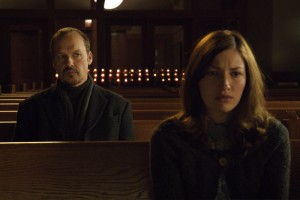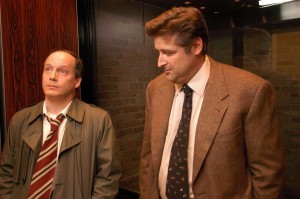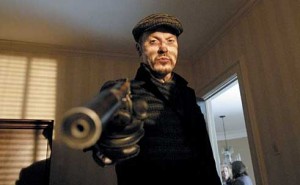The Merry Gentleman
 In the pantheon of films about depressed hitmen either on their last job or on the verge of suicide, The Merry Gentleman stands tall, in the middle of the pack. Not as insightful, moving, nor funny as the William H. Macy starring Panic* or as wonderfully awful as Nicholas Cage’s foray in the remake of Bangkok Dangerous, Michael Keaton’s The Merry Gentleman is never exciting or moving or even moderately diverting.
In the pantheon of films about depressed hitmen either on their last job or on the verge of suicide, The Merry Gentleman stands tall, in the middle of the pack. Not as insightful, moving, nor funny as the William H. Macy starring Panic* or as wonderfully awful as Nicholas Cage’s foray in the remake of Bangkok Dangerous, Michael Keaton’s The Merry Gentleman is never exciting or moving or even moderately diverting.
 Originally, writer Ron Lazzerati was set to direct The Merry Gentleman, but he had to drop out because of appendicitis, and Keaton took over. Perhaps as compensation, Keaton spends the entire movie in visible agony, his facial muscles struggling to provide a reaction. This makes sense given the context of the cold, disconnected contract killer, but there are no characters who do reveal more than the basics, just the standard alcoholic cop who is supposed to be the sad-sack who solves the crime while alienating the girl (and should have been played by Joe Mantegna instead of the Chris Penn-ish Tom Bastounes), but really just provides a conduit for exposition, as little as there is. The girl, and despite being a woman in her early 30’s, a girl is what she is, is another in a long line of innocent, naïve victims, with no shading or reason to be except as the center of the movie, being pursued for her purity from all sides. Kelly Macdonald, as the girl, represents total inertia, she never does anything, things happen to her and she smiles politely, unaware of the dangers around her. Only one scene, where she is approached by a man from her past, has any tension, and that’s simply because there’s no way to tell if he’s sincere about being a born again Christian, or if his self-righteousness is a ploy and he intends to kill her. Or maybe he’s a born again who wants to kill her.
Originally, writer Ron Lazzerati was set to direct The Merry Gentleman, but he had to drop out because of appendicitis, and Keaton took over. Perhaps as compensation, Keaton spends the entire movie in visible agony, his facial muscles struggling to provide a reaction. This makes sense given the context of the cold, disconnected contract killer, but there are no characters who do reveal more than the basics, just the standard alcoholic cop who is supposed to be the sad-sack who solves the crime while alienating the girl (and should have been played by Joe Mantegna instead of the Chris Penn-ish Tom Bastounes), but really just provides a conduit for exposition, as little as there is. The girl, and despite being a woman in her early 30’s, a girl is what she is, is another in a long line of innocent, naïve victims, with no shading or reason to be except as the center of the movie, being pursued for her purity from all sides. Kelly Macdonald, as the girl, represents total inertia, she never does anything, things happen to her and she smiles politely, unaware of the dangers around her. Only one scene, where she is approached by a man from her past, has any tension, and that’s simply because there’s no way to tell if he’s sincere about being a born again Christian, or if his self-righteousness is a ploy and he intends to kill her. Or maybe he’s a born again who wants to kill her.
 Keaton’s job appears to be to perform his killing assignment and then chicken out on his suicidal intentions. So when he becomes Macdonald’s protector, you’d think it would develop either sexually or platonically. But all the screenplay has on its mind is to turn it into a Little Red Riding Hood situation (he even buys her a bright red coat), until the inevitable reveal of his profession. While we are shown through montage that they bond, we don’t know why, he doesn’t talk and she’s skittish and intellectually malnourished. We learn that she’s a churchgoer and she likes the idea of Christmas, and that’s it. Her one instance of spontaneity, when she brings Keaton some snacks while he’s in the hospital, and says “Nurses love rum balls… I don’t know what that means,” hints at the possible direction The Merry Gentleman could have taken if everything weren’t played so gloomy and solemn. Keaton has opportunities, but the conclusion, which he may think is open-ended, is simply unfinished. His confusion in establishing a consistent tone is undermined by the needy score, which implies a level of playfulness and uplift totally missing from the movie not to mention how much it sounds like the very specific style of Thomas Newman (who was responsible for the scores for The Shawshank Redemption and American Beauty). The Merry Gentleman plays like an undeveloped blueprint for an intimate thriller, maybe Keaton didn’t have time to turn things around. It is a slow film, which could work, if it eventually became intriguing, but all we get is a showcase for annoying people who would have nothing in their lives, if they weren’t already in a movie.
Keaton’s job appears to be to perform his killing assignment and then chicken out on his suicidal intentions. So when he becomes Macdonald’s protector, you’d think it would develop either sexually or platonically. But all the screenplay has on its mind is to turn it into a Little Red Riding Hood situation (he even buys her a bright red coat), until the inevitable reveal of his profession. While we are shown through montage that they bond, we don’t know why, he doesn’t talk and she’s skittish and intellectually malnourished. We learn that she’s a churchgoer and she likes the idea of Christmas, and that’s it. Her one instance of spontaneity, when she brings Keaton some snacks while he’s in the hospital, and says “Nurses love rum balls… I don’t know what that means,” hints at the possible direction The Merry Gentleman could have taken if everything weren’t played so gloomy and solemn. Keaton has opportunities, but the conclusion, which he may think is open-ended, is simply unfinished. His confusion in establishing a consistent tone is undermined by the needy score, which implies a level of playfulness and uplift totally missing from the movie not to mention how much it sounds like the very specific style of Thomas Newman (who was responsible for the scores for The Shawshank Redemption and American Beauty). The Merry Gentleman plays like an undeveloped blueprint for an intimate thriller, maybe Keaton didn’t have time to turn things around. It is a slow film, which could work, if it eventually became intriguing, but all we get is a showcase for annoying people who would have nothing in their lives, if they weren’t already in a movie.
* Jason Priestley’s dopey hitman in Coldblooded also fits the mold, and despite some obvious story turns, it is an unfortunately ignored movie, with one of the great black comedy conclusions.



